
Harold Edward Holt was an Australian politician who served as the 17th prime minister of Australia from 1966 until his presumed death in 1967. He held office as leader of the Liberal Party.

The Liberal Party of Australia is a centre-right political party in Australia, one of the two major parties in Australian politics, along with the centre-left Australian Labor Party. It was founded in 1944 as the successor to the United Australia Party.
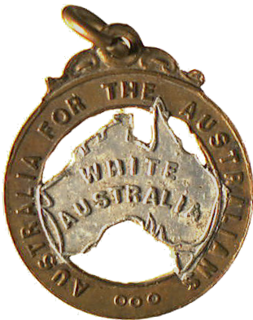
The White Australia policy is a term encapsulating a set of historical policies that aimed to forbid people of non-European ethnic origin, especially Asians and Pacific Islanders, from immigrating to Australia, starting in 1901. Governments progressively dismantled such policies between 1949 and 1973.

The Australian National University (ANU) is a public research university located in Canberra, the capital of Australia. Its main campus in Acton encompasses seven teaching and research colleges, in addition to several national academies and institutes.

The Portuguese Communist Party is a communist, Marxist–Leninist political party in Portugal based upon democratic centralism. The party also considers itself patriotic and internationalist, and it is characterized as being between the left-wing and far-left on the political spectrum.
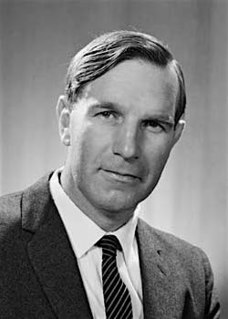
Ian McCahon Sinclair is a former Australian politician who served as leader of the National Party from 1984 to 1989. He was a government minister under six prime ministers, and later Speaker of the House of Representatives from March to November 1998.

Concetta Anna Fierravanti-Wells is an Australian politician who was a Senator for New South Wales from 2005 to 2022, representing the Liberal Party. She served as Minister for International Development and the Pacific in the Turnbull Government from 2016 to 2018. She grew up in Port Kembla, New South Wales, and, prior to entering politics, worked as a lawyer and policy adviser.

The Department of Foreign Affairs and Trade (DFAT) is the department of the Australian federal government responsible for foreign policy and relations, international aid, consular services and trade and investment. In 2021, DFAT allocated USD 3.4 billion of official development assistance, equivalent to 0.22% of gross national income.
The diplomatic history of Australia refers to the historical events surrounding Australian foreign relations. Following the global change in the dynamics of international state of affairs in the 20th century, this saw a transition within Australia's diplomatic situation to broaden outside of exclusively commonwealth and western European nations. Its core relationship was with Great Britain until 1941, and with the United States and New Zealand since then as represented by ANZUS. In the 21st century trade has soared with China. However relations have cycled back and forth from friendly to strained. For recent relations see also Foreign relations of Australia.
Grey Power was an Australian political party and lobby group, first registered in 1983. At the federal elections of 1984 and 1987 it ran candidates, but on both occasions these candidates did poorly. The group was designed to represent the elderly vote, advocating issues dealing with aged care and a mature perspective on national policy; hence the name "grey power".
Opposition to immigration, also known as anti-immigration, has become a significant political ideology in many countries. In the modern sense, immigration refers to the entry of people from one state or territory into another state or territory in which they are not citizens. Illegal immigration occurs when people immigrate to a country without having official permission to do so. Opposition to immigration ranges from calls for various immigration reforms, to proposals to completely restrict immigration.
Right-wing populism, also called national populism and right-wing nationalism, is a political ideology which combines right-wing politics and populist rhetoric and themes. Its rhetoric employs anti-elitist sentiments, opposition to the Establishment, and speaking to and/or for the "common people". Recurring themes of right-wing populists include neo-nationalism, social conservatism, and economic nationalism. Frequently, they aim to defend a national culture, identity, and economy against perceived attacks by outsiders.
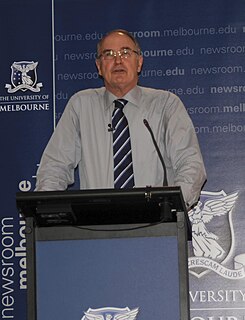
Ross Gregory Garnaut is an Australian economist, currently serving as a vice-chancellor's fellow and professorial fellow of economics at the University of Melbourne. He is the author of numerous publications in scholarly journals on international economics, public finance and economic development, particularly in relation to East Asia and the Southwest Pacific.
The Republican Party of Australia was a minor Australian political party dedicated to ending the country's links with the United Kingdom and establishing a republic. It was formed in 1982 and registered by the Australian Electoral Commission on several occasions prior to being voluntarily deregistered in 2021. It was not linked with the Australian Republic Movement.
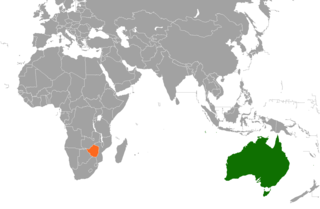
Foreign relations exist between Australia and Zimbabwe. Both countries have full embassy level diplomatic relations. Australia currently maintains an embassy in Harare, and Zimbabwe maintains an embassy in Canberra.

Yellow Vest Australia (YVA), until 9 April 2019 known as the Australian Liberty Alliance (ALA), was a minor right-wing to far-right political party in Australia. The party was founded by members of the Q Society and has been described as the political wing of Q Society. The leader was Debbie Robinson (President), who was also national president of the Q Society. On 4 September 2020, the Australian Electoral Commission removed the Yellow Vest Australia from the registered political party list.
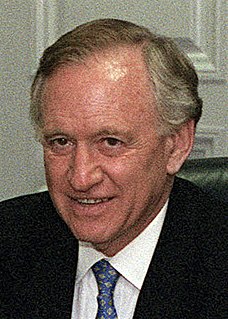
A spill of the leadership of the Liberal Party of Australia took place on 9 May 1989, following internal maneuverings by supporters of John Howard's long-time rival, Andrew Peacock. The spill was won by Andrew Peacock over John Howard by 44 votes to 27.
Fraser Anning's Conservative National Party was a far-right nationalist political party in Australia founded by Fraser Anning in April 2019, when he was a senator for Queensland. Anning had previously been a senator for One Nation and Katter's Australian Party, and sat as an independent before founding the new party. The party contested the 2019 federal election, but failed to win a seat.
The Australian National Alliance (ANA) was a far-right political party active in Australia from 1978 to 1981. Founded in January 1978, it was one of Australia's earliest anti-Asian immigration parties. The ANA contested the 1979 Grayndler by-election, in which its secretary and candidate Frank Salter received 863 votes (1.64%).
Moderates, also known as Modern Liberals or small-l liberals, are members, supporters, or voters of the Liberal Party of Australia who are economically conservative, but progressive on social and environmental policies. They compete with the Liberal Party's other two factions: The National Right and the centre-right. Moderate Liberals often represent inner city and wealthy Lower House seats or are in the Senate.











